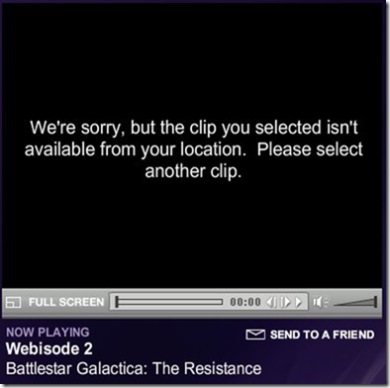links for 2007-05-06
-
“YouTube is going to start helping some of its indie video content creators make money, starting tomorrow. The company will launch a program that puts the creators of some of the more popular YouTube channels…”
-
“Last month, two Belgian publications reported that the Brussels police have begun an investigation into a citizen’s allegations of rape — in Second Life.” (Provoking, once more, the ‘what is rape’ question through a cyberspace lens. Ref: Julian Dibbell)
-
A funny, if crude (in the editing sense), mashup of Queen and Lost. Must by an oldie, though, judging from the cast! [Via Jo]
-
Good summary post of the Digg “09-f9-11-02-9d-74-e3-5b-d8-41-56-c5-63-56-88-c1” controversy.
-
Apparently “AACS copy protection” are looking at how to prosecute everyone who blogged/posted “09-f9-11-02-9d-74-e3-5b-d8-41-56-c5-63-56-88-c1”. I can’t see how that’s going to work! 😛
-
Lessig celebrates the fact that CNN will release all footage from the Presidential debates for free (read: public domain). This opens the way for cititzen-produced political mash-ups is a most profound way. (*ahem* Australia, here’s an idea…)
24 Hours of Flickr
Today 05.05.2007 (which is one of those lovely dates which makes sense on both US and normal people’s calendars), photography sharing and community building uber-site, Flickr, is running an event called 24 Hours of Flickr. The details:
To celebrate this global community, we invite you to join us in “24 Hours of Flickr” – a day-long global photo project. On May 5, 2007, grab your camera and whatever else you need, and chronicle your day in pictures. The group’s photos will be featured at Flickr events around the world this summer and in a companion book, which will contain a selection of photographs chosen from the group…
While the day is just beginning in the US, it’s well into the night here in Perth. I’ve remembered to carry my camera some of the day, but a lot of what I did wasn’t photography-friendly (I didn’t think taking pictures in the screening of Spider-Man 3 would be overly well received!). I’ve taken a few shots of my day in a set here. Thankfully, the paucity of shots today meant is was rather easy picking my one decent shot for the Flickr pool. The only better candidate was a photo of Emily’s work-in-progress painting of Tulips, but I it seemed wrong to post a photograph of a painting for a photography pool! So here’s the image I settled on …
It’s called Wrecked Angles (oh, I do love a good pun); it’s all rectangles, unfinished painted walls, security-wired windows and cracked glass. And yet, in black and white, aesthetically quite fascinating. (It was taken in Subiaco, Western Australia, but by no means indicative of the suburb!) It doesn’t really look that impressive scaled down, but take a look full-size and see what you think.
I can’t wait to see what other photos emerge during the day! 🙂
links for 2007-05-05
-
Plugin to easily convert ALL WordPress RSS outputs to Feedburner feeds with a few clicks.
-
Uber-cool 1974 anti-sexism commercial where Batgirl tells Batman and Robin a thing or two about equal rights and pay (features cast from the 70s series!). [Via]
-
“Now, owners can meet each other by swapping information between chips mounted on Fido’s collar.” (Parasitic social networking via canine RFID?!?)
links for 2007-05-03
-
“Actress Joanna Cassidy revealed on her web site that an unknown number of scenes from the cyberpunk thriller Blade Runner have recently been re-shot in preparation for a 25-year anniversary special-edition DVD that should come out this year.”
links for 2007-05-02
-
The BSG Wiki blog is blogging about MIT5 talks about the Wiki for BSG … talk about all my worlds colliding!!!
-
Jean Burgess has (another) great post thinking about the place of Twittering, blogging and other forms of connectivity outside of the official ‘sage on teh stage’ conference presentation and Q&A sessions.
“We’re sorry, but the clip you selected isn’t available from your location:” Watching Battlestar Galactica in Australia and the Tyranny of Digital Distance
I just submitted an abstract for the Media International Australia special issue ‘Beyond Broadcasting: TV for the Twenty-first Century’. Here it is:
“We’re sorry, but the clip you selected isn’t available from your location:” Watching Battlestar Galactica in Australia and the Tyranny of Digital Distance
[Figure 1. Screen-capture from http://www.scifi.com/battlestar/, 11 September 2006]
In the late 1960s, conservative Australian historian Geoffrey Blainey coined the term “the tyranny of distance” to describe how the geographic gap between Australia and the centres of the Western world (US, UK) played a fundamental role is shaping the Australian psyche and character (Geoffrey Blainey, The Tyranny of Distance, Sun Books: Melbourne, 1966). Thirty something years later and the world is far more widely considered a global village; the world wide web, email and a million other applications have made real-time information-heavy communication and commerce the norm. However, while information transfers have made ‘distance’ much less of a concern in a number of ways, many policies, practices and systems of commerce still operate as though they are centred on goods moving at the speed of physical shipping, not allowing for information moving at the speed of light down a copper or optical wire. In an era when ‘the tyranny of distance’ means so much less in many contexts, this paper will argue that in the multimedia markets of contemporary society there is, rather, a prevailing tyranny of digital distance which marks out those areas of communication and commerce in which the potential and, indeed, expectation of synchronous global culture (at least for English-speaking countries) leads to constant state of confusion and annoyance – on both personal and legal levels – when those expectations are not met.
The North American-produced television series Battlestar Galactica, re-imagined for the twenty-first century (from an original 1970s series), has consistently been at the cutting edge of television and cross-media. Executive producer Ronald D. Moore and the Battlestar team utilise not just blogs and production-side video-blogs, but also create episodic commentary podcasts, make deleted scenes available online, and have even put two full episodes online for free for viewing. Likewise, Battlestar was one of the first shows available via Apple’s online iTunes Store. Given the amount of extra online content, and the show’s science fiction genre, Battlestar has a large and very active fan community who consume both the television show itself and the officially produced extra material, as well as actively creating and discussing their own derivative ‘fannish’ works ranging from blog commentaries to fan-created videos. Thus, when the show’s producers launched a series of 3 to 4 minutes ‘webisodes’ to re-build interest in the show prior to the launch of its third season, fans across the (wired) globe were understandably excited. However, when citizens of Australia, the UK, Canada or any other country outside the US tried to view these webisodes, they were met with a notice saying: “We’re sorry, but the clip you selected isn’t available from your location.” The owners of Battlestar (NBC) elected to restrict these webisodes to residents of the US only. This decision upset fans across the global Battlestar audience, with US fans quickly circumventing the restrictions and passing copies of the webisodes to their international fellows. In this paper, I will contend that this moment typifies the tyranny of digital distance, exemplifying the legal, ethical and practical issues raised when a globally-promoted television series ‘centres’ on a single national audience. I outline the difficulties of ‘watching’ Battlestar from Australia, and argue for distribution modes which are more in keeping with the technological (and fan-led) potential of digital distribution.
As you might imagine, this paper will draw together my previous thinking about the tyranny of digital distance which you can read about here and here. I’m also finishing off another Battlestar-related paper that stopped being written for a year, but is now being finished off for a new collection. It’s going to be a busy month, but I’m hopeful both of these will be well polished before Emily and I get married on June 9th (presuming this abstract is accepted). Wish me luck!
Update (8 May 2007): The abstract has been accepted! Thankfully, though, full papers aren’t needed until August 1st so I’ll be writing this after Emily and I return from our honeymoon (in Venice!!) :).
Update 2 (21 September 2007): The full version of this paper has been accepted after peer review, and will appear in Media International Australia issue 126, which is scheduled to be released in February 2008.
Update 3 (26 March, 2008): You final version of this paper has appeared, and you can read it following the link from this post.


